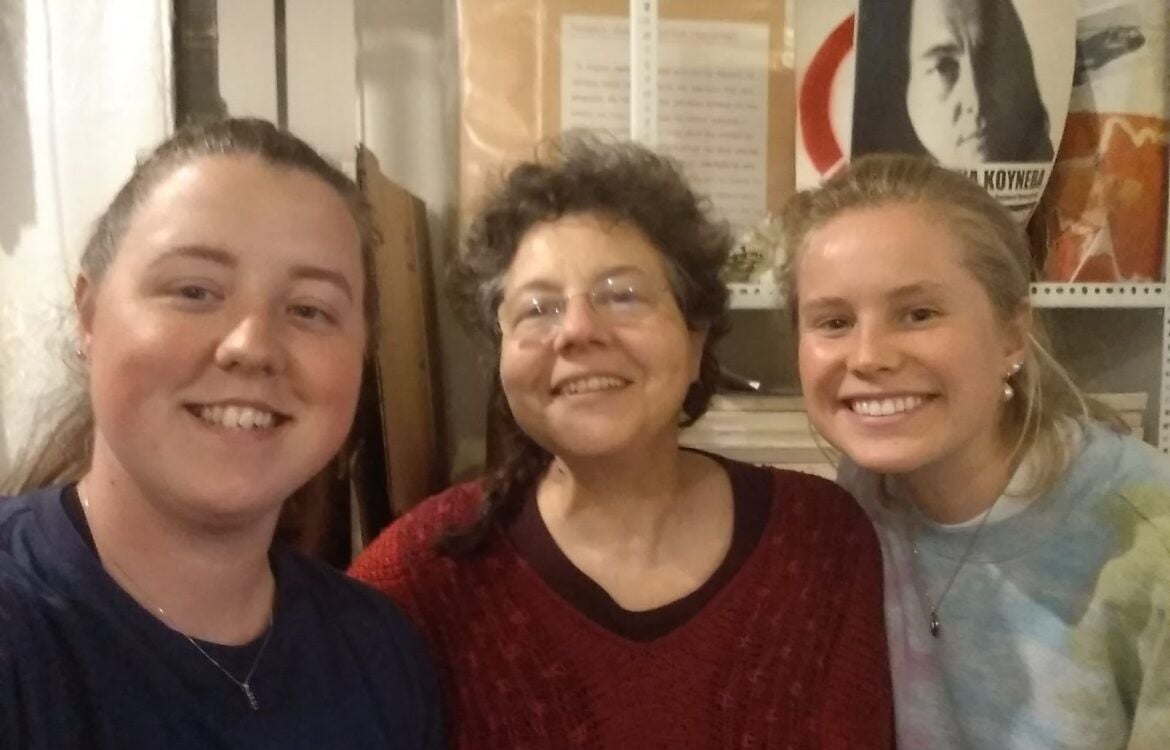
‘An Overwhelmingly Positive Experience’ – Volunteering at Delfys Women’s Archive in Athens
An article by CYA Spring ‘22 Student Meredith Wilson.
Walking up to the unassuming metal-thatched door of Konstantinoupoleos 299, an entrance adorned only with a sticker bearing the pictogram symbol for women, one would not suspect the abundance of history that lies nestled beyond it. This door leads to Delfys Women’s Archive, a decades-old archive containing textual and artifactual documentation of the women’s movement in Greece. The archive is the successor of the Women’s Archive that was connected to the Women’s Bookshop in Athens, a feminist bookstore that operated from 1983 to 1990.
Delfys, named after the Ancient Greek word for “womb,” operates out of a privately-owned basement apartment. Upon entering the site, visitors are greeted by a spacious open room, filled from floor to ceiling with material remnants of prior stages of the women’s movement: posters and pictures hang from the walls, rows of cataloged magazines fill the shelves, and boxes of clothing articles sit tucked away on the perimeter. The space emits a cozy and home-like energy, an atmosphere supported by the bright pillows dotting the floor in the archive’s reading nook and the small kitchen that sits in the back corner of the room.
Visitors are likely to be greeted with a warm drink and sweet treats by the generous Anna Mihopoulou, a historian who curates the archive in conjunction with collaborator Anna Markoulidaki. Mihopoulou was herself an active participant in the second-wave feminist movement in Greece and one of the operators of the Women’s Bookshop from which the archive was originally born. As such, she approaches archival work with a deep, admirable passion and a willingness to share anecdotes of her experience in the movement—stories that bring the archive’s contents to life.
The contents are organized into a system of thematic categories—media, sexuality, and politics, to name a few—that Mihopoulou has carefully cultivated and expanded since the archive’s inception. Cataloged archival materials are then available to be viewed and investigated, and they often draw researchers pursuing related topics into the archive. Indeed, part of the archive’s purpose is to collect artifacts so that they may be preserved and used for educational purposes. When new materials come in, whether through donation, personal collection, or Mihopoulou’s own efforts to find flyers around Athens dedicated to the feminist movement, volunteers help to sort the artifacts into the pre-established categories. These volunteers are often University students from Athens, though Mihopoulou is open to welcoming all who take interest in the archive’s work.
Over the past several years, numerous College Year in Athens (CYA) students have done just this. While much of the archive’s contents are in the Greek language, there are yet a number of volunteering tasks available to English speakers. For instance, the archive features a section of English-language materials that have been cataloged by CYA students. Similarly, during the spring of 2020, CYA students engaged in a project to identify, scan, and categorize articles related to women and feminism in Mihopoulou’s personal collection of English-language TIME magazines from the 1970s and 1980s. Unfortunately, the COVID-19 pandemic halted these efforts, and the CYA students were forced to return to America before the project was finished.
This spring, the project was resumed by me and fellow CYA student Ruby Vickers. We both learned of the archive’s work through CYA professors and administration and have had an overwhelmingly positive experience volunteering there.
“This internship has added to the overall study abroad experience by helping me to better understand the country I am studying in. It has made me feel more at home, and it has been fun to be involved in a project outside of classes,” Ruby noted.
For my own part, working at Delfys Archive has contributed to my study abroad experience by offering me a tangible connection to our local community in Athens and an immersive experience within that community. It provided me with another adult mentor from whom to learn about Greek culture and history, and it offered a helpful reference point through which to compare feminist movements cross-culturally.
Ruby and I also share a great appreciation for Anna Mihopoulou herself. Anna is lovely, and it has been a pleasure and a privilege to work with her. She is truly a fountain of knowledge, and it is fascinating to learn about her perspective given her own involvement in the women’s movement within Greece. One happy memory of Anna that comes to mind is when, on our first day of volunteering, she inquired about our interest in the women’s movement and the archive. She essentially asked us why and how our own personal stories/histories had brought us there, and I so appreciated her genuine interest in our lives and how they had shaped our interests. Ruby echoed these sentiments: “Volunteering at Delfys has definitely been a meaningful experience for me. It has made me consider my own feminism, and how there are cultural differences to be aware of. I also just really value getting to know Anna and sharing stories, as well as the actual archival work.”
CYA is grateful to Anna Mihopoulou for the wonderful work she does at the archive and for graciously welcoming students into it. The partnership between CYA and the archive has been an invaluable learning experience for students who have volunteered at Delfys, including me, and this beneficial experience would not have been possible without her.
For information regarding Volunteering Opportunities at CYA, click here






